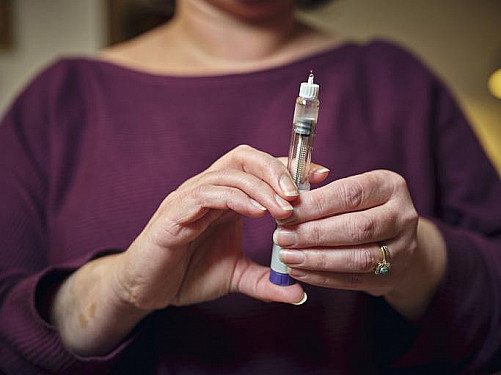Behcet's disease
- Reviewed by Robert H. Shmerling, MD, Senior Faculty Editor, Harvard Health Publishing; Editorial Advisory Board Member, Harvard Health Publishing
What is Behcet's disease?
Behçet's (bay-setz) disease is a rare disease that causes inflammation of many parts of the body. These include the skin of the genital area, lining of the mouth, eye, nervous system, joints, and blood vessels. The most characteristic problems include ulcers in the mouth and genital areas, and serious eye inflammation. It is also called Behçet's syndrome.
The exact cause of the disease remains unclear. But Behçet's disease is thought to involve an autoimmune response. This means the body's defense mechanism begins to attack its own tissues. Something in the environment may trigger this abnormal immune response in susceptible individuals. Genetic factors may also play a role.
Usually, symptoms flare up repeatedly and then improve. The time between attacks may be as short as a few days or as long as years. In some people with more severe disease, symptoms vary in intensity but are always present.
The first symptoms usually appear between ages 20 and 30.
Symptoms of Behcet's disease
Symptoms are different in each person. They range from mild to severe.
People with Behçet's disease usually have painful sores in the mouth that are quite similar or identical to canker sores. But while canker sores generally occur one at a time, people with Behçet's disease tend to have multiple sores.
More than half of people with Behçet's disease have sores around the genitals. These sores look like the mouth sores.
Behçet's disease can cause rashes, including acne-like bumps on the skin. It can cause inflammation around hair follicles. Blood clots can occur, usually in the legs. They can cause pain and tenderness.
Many people with Behçet's disease have joint pain and swelling, usually in the knees, ankles, and wrists. The joints can be stiff and painful for several weeks at a time. But the disease usually does not cause long-term joint damage or deformity.
Up to three-quarters of people with Behçet's disease have eye inflammation. Specifically, a condition called uveitis usually shows up within two years of the first symptoms. At first, uveitis can cause blurred vision. Repeated flare-ups of uveitis can lead to decreased vision or even blindness.
In about 10% of cases, Behçet's disease causes inflammation of the brain and spinal cord. Symptoms include fever, stiff neck, headache, and uncoordinated movements.
Rarely, Behçet's disease will inflame the intestinal tract. This can cause diarrhea, constipation, vomiting, and stomach pain.
Diagnosing Behcet's disease
Diagnosing Behçet's disease can be difficult. The disease is rare and its symptoms can be similar to those of other diseases.
Certain rare characteristics of this disease can be helpful in diagnosis, such as recurrent, simultaneous, and multiple oral and genital ulcers. In addition, inflammation of the lungs' arteries in Behçet's disease may cause an aneurysm. This rarely occurs in any other condition.
Some doctors test for Behçet's disease by pricking the skin with a needle. This is called a pathergy test. After one or two days, people with Behçet's can develop a lump or nodule where the needle broke the skin.
A skin biopsy can also support the diagnosis. In a biopsy, a small piece of skin is removed to be examined in a laboratory.
No tests can confirm or rule out Behçet's disease with great certainty. To diagnose the disease, doctors look for the key symptoms. These include recurring mouth sores, genital sores, skin rashes, and eye inflammation.
Expected duration of Behcet's disease
Behçet's disease can be a chronic (long-lasting) condition. The symptoms sometimes diminish over time and disappear for as long as several years.
Preventing Behcet's disease
There is no way to prevent Behçet's disease.
Treating Behcet's disease
Research regarding treatment of a condition as rare as Behçet's disease is difficult to perform. Large, definitive studies have not been performed. Therefore, it is uncertain which treatment options are best. In general, treatment focuses on relieving the symptoms and depends on which parts of the body the disease affects.
- Rashes and sores in the mouth and genital area:
- for mild disease: topical corticosteroids (ointments, creams, rinses applied to the skin)
- for more significant disease or if topical treatment is not successful: colchicine, dapsone apremilast, or, rarely, thalidomide
- for more severe disease: immune suppressants, including a pill form of corticosteroid, azathioprine (Imuran), or methotrexate (Otrexup, Trexall, Rheumatrex)
- for mouth pain: novocaine-type agents; a mixture of Kaopectate, diphenhydramine (Benadryl), and lidocaine as a mouth rinse can provide temporary relief
- Arthritis — The most commonly prescribed medications are colchicine, nonsteroidal anti-inflammatory drugs (NSAIDs), corticosteroids, hydroxychloroquine (Plaquenil), sulfasalazine (Azulfidine), azathioprine (Imuran), and methotrexate
- Eye disease — Corticosteroids (drops, injections, or pills), colchicine, and immunosuppressants (including cyclosporine drops or pills, cyclophosphamide, and azathioprine).
Some studies suggest that immunosuppressants such as interferon (Betaseron and others), adalimumab (Humira), azathioprine (Imuran), etanercept (Enbrel), infliximab (Remicade), mycophenolate mofetil (Cellcept), or rituximab (Rituxan) may improve disease that has not responded to other treatments. For severe disease that affects many parts of the body, combinations of medications may be prescribed.
Vascular surgery may be necessary for aneurysms. This is particularly true if they are expanding and at risk for rupture. Blood thinners are usually recommended if blood clots complicate this disease.
Nonmedication therapy for joint pain, including exercise, is encouraged as soon as symptoms allow.
When to call a professional
Make an appointment with your doctor if you have unexplained sores in your mouth or other symptoms of Behçet's disease.
Prognosis
Most people with Behçet's disease are able to control their symptoms and live normal lives. If the first symptoms cannot be controlled with medications, more serious symptoms can appear.
Additional info
The American Behçet's Disease Association
http://www.behcets.com/
American College of Rheumatology
http://www.rheumatology.org/
American Autoimmune Related Diseases Association (AARDA)
http://www.aarda.org/
Arthritis Foundation
http://www.arthritis.org/
National Institute of Arthritis and Musculoskeletal and Skin Diseases
http://www.niams.nih.gov/
About the Reviewer

Robert H. Shmerling, MD, Senior Faculty Editor, Harvard Health Publishing; Editorial Advisory Board Member, Harvard Health Publishing
Disclaimer:
As a service to our readers, Harvard Health Publishing provides access to our library of archived content. Please note the date of last review or update on all articles.
No content on this site, regardless of date, should ever be used as a substitute for direct medical advice from your doctor or other qualified clinician.















